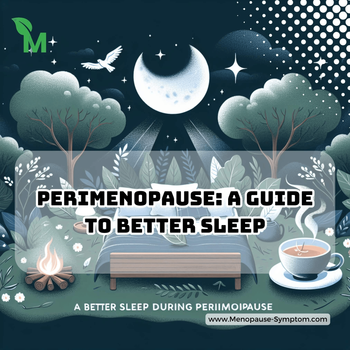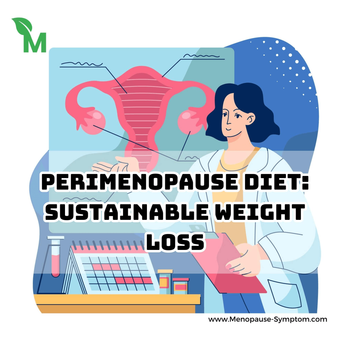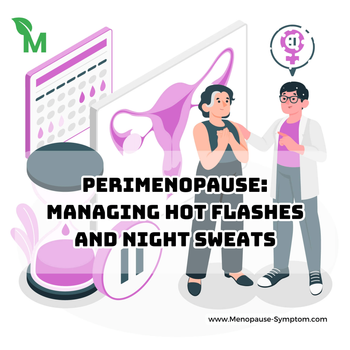Perimenopause Diet - Enjoy The Journey
On
07/10/2024Reading time:
4 min
Summary:
Perimenopause is an important transitional stage in a woman's life with many changes in health and psychology. This stage usually lasts from 2 to 10 years, with many signs such as hot flashes, insomnia, and mood swings.
However, instead of seeing this as a difficult stage, women can enjoy this journey by applying a reasonable and balanced diet. This article will help you discover how the perimenopause diet can help you maintain your health, optimism and comfort during this stage.
Understanding Perimenopause
Perimenopause is the time when the body begins the natural transition to menopause, marking the end of a woman's reproductive years. This period usually occurs between the ages of 45-50, and can last 2-5 years depending on the person. It is a physiological process that occurs when the ovaries begin to reduce the production of estrogen and progesterone hormones.
Understanding the knowledge about perimenopause will help you find the right methods for your body. One of the methods to take care of your body from the inside is to have a "Healthy Diet", rich in nutrients that can help reduce unwanted symptoms during perimenopause. Remember, taking care of yourself and adjusting your lifestyle are very necessary during this period.
Foods to Add to the Premenopausal Diet
When it comes to the premenopausal diet, foods that should be prioritized include:
· Foods rich in phytoestrogen: Seeds such as flax seeds, soybeans and soy products have the ability to provide natural estrogen to the body, helping to reduce the symptoms of perimenopause.
· Fruits and vegetables: They not only contain many vitamins and minerals but also provide fiber, support the digestive system and increase resistance. Fruits like avocados, oranges, grapefruit, and strawberries are great for perimenopause.
· Whole grains: Oatmeal, brown rice, and whole wheat are all great sources of complex carbohydrates that help maintain energy and balance blood sugar.
· Dark green vegetables: Vegetables like kale, broccoli, and spinach are great sources of vitamin K, calcium, and magnesium, all of which are important for bone health during menopause.
· Good fats: Adding sources of omega-3 fats like salmon, walnuts, and olive oil can help reduce inflammation and support heart health.
· Milk and dairy products: Yogurt and cheese have protein and calcium, which support bone health and reduce the risk of osteoporosis.
Foods to Avoid
In the perimenopause diet, you should limit the following foods:
· Processed foods: These foods often contain a lot of sugar, salt and preservatives, which can increase hot flashes and discomfort.
· Caffeine: Caffeine can increase anxiety and insomnia. Limit your consumption of coffee, strong tea and some carbonated soft drinks during perimenopause.
· Alcohol: Too much alcohol can thin the blood, increasing the symptoms of perimenopause, so limit or avoid it if possible.
· Foods high in sugar and saturated fat: These foods not only cause weight gain but also have a negative impact on emotions and spirit.
Planning a Perimenopause Diet
To create a scientific perimenopause diet, you need to:
· Establish regular eating habits: Instead of eating large meals, divide them into several small meals throughout the day to maintain energy and control cravings.
· Drink enough water: Water helps balance the body, aids digestion and reduces hot flashes. Try to drink about 2 liters of water every day.
· Exercise: In addition to diet, regular exercise not only helps maintain weight, but also improves physical and mental health.
Benefits of Tracking Your Diet
Tracking your perimenopause diet helps you know what you are feeding your body and can adjust accordingly depending on your stage and condition. When you have a proper diet, your body will feel healthier and create a positive connection with your spirit. You will have a better understanding of what is necessary for your health, thereby making better decisions in your daily lifestyle.
The Importance of Optimism
During perimenopause, hormonal changes can greatly affect your mood and emotions. Therefore, maintaining an optimistic spirit is very important. Connecting with the community by participating in activities you love, sharing with friends and family, and exploring new hobbies can help you experience life in a more positive way.
Finding Support
If you experience uncomfortable symptoms that you cannot control, do not hesitate to seek support from your doctor or dietitian. They can advise you on appropriate methods, additional medications or hormone therapy. Professional support will help you adjust your lifestyle and diet more effectively during perimenopause.
Conclusion
Perimenopause can be a challenge, but it is also an opportunity for you to take better care of yourself. By applying a reasonable perimenopause diet, you will not only maintain your health but also discover new things on this journey. Enjoy and welcome the new stage of life with confidence and self-respect. Remember, health is always the most valuable asset, and taking care of yourself is one of the best ways to show love to yourself.
Source: Team MPS compiled, analyzed and wrote. Please dont reup without source. Many thanks.

Perimenopause: A Guide To Better Sleep
Invalid Date
Perimenopause is an important transitional stage in a woman's life that usually begins after the age of 40. This is the stage when a woman's body experiences many changes related to psychology and physiology, as well as health.

Perimenopause Diet: Sustainable Weight Loss
09.02.2024
Perimenopause, an important transitional stage in a woman's life, is often associated with many physical and psychological changes.

Perimenopause: Managing Hot Flashes And Night Sweats
Invalid Date
Perimenopause is a natural stage in a woman's life, usually starting around age 40 to 50. This is when the body begins to experience hormonal changes, leading to a variety of uncomfortable symptoms, the most prominent of which are hot flashes and night sweats.
